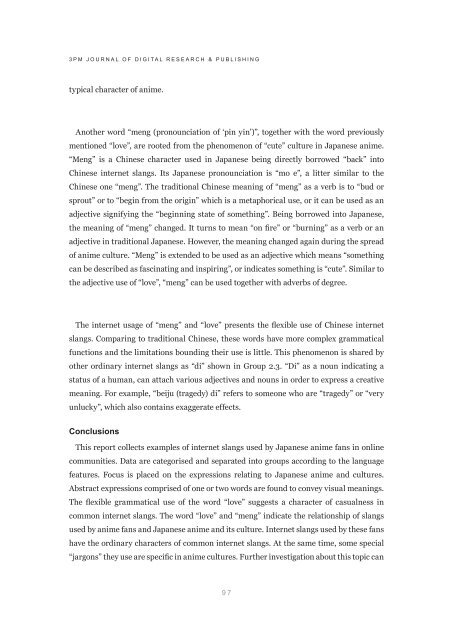3pm Journal of Digital research & publishing - artichoke web design
3pm Journal of Digital research & publishing - artichoke web design
3pm Journal of Digital research & publishing - artichoke web design
You also want an ePaper? Increase the reach of your titles
YUMPU automatically turns print PDFs into web optimized ePapers that Google loves.
<strong>3pm</strong> <strong>Journal</strong> <strong>of</strong> <strong>Digital</strong> <strong>research</strong> & <strong>publishing</strong><br />
typical character <strong>of</strong> anime.<br />
Another word “meng (pronounciation <strong>of</strong> ‘pin yin’)”, together with the word previously<br />
mentioned “love”, are rooted from the phenomenon <strong>of</strong> “cute” culture in Japanese anime.<br />
“Meng” is a Chinese character used in Japanese being directly borrowed “back” into<br />
Chinese internet slangs. Its Japanese pronounciation is “mo e”, a litter similar to the<br />
Chinese one “meng”. The traditional Chinese meaning <strong>of</strong> “meng” as a verb is to “bud or<br />
sprout” or to “begin from the origin” which is a metaphorical use, or it can be used as an<br />
adjective signifying the “beginning state <strong>of</strong> something”. Being borrowed into Japanese,<br />
the meaning <strong>of</strong> “meng” changed. It turns to mean “on fire” or “burning” as a verb or an<br />
adjective in traditional Japanese. However, the meaning changed again during the spread<br />
<strong>of</strong> anime culture. “Meng” is extended to be used as an adjective which means “something<br />
can be described as fascinating and inspiring”, or indicates something is “cute”. Similar to<br />
the adjective use <strong>of</strong> “love”, “meng” can be used together with adverbs <strong>of</strong> degree.<br />
The internet usage <strong>of</strong> “meng” and “love” presents the flexible use <strong>of</strong> Chinese internet<br />
slangs. Comparing to traditional Chinese, these words have more complex grammatical<br />
functions and the limitations bounding their use is little. This phenomenon is shared by<br />
other ordinary internet slangs as “di” shown in Group 2.3. “Di” as a noun indicating a<br />
status <strong>of</strong> a human, can attach various adjectives and nouns in order to express a creative<br />
meaning. For example, “beiju (tragedy) di” refers to someone who are “tragedy” or “very<br />
unlucky”, which also contains exaggerate effects.<br />
Conclusions<br />
This report collects examples <strong>of</strong> internet slangs used by Japanese anime fans in online<br />
communities. Data are categorised and separated into groups according to the language<br />
features. Focus is placed on the expressions relating to Japanese anime and cultures.<br />
Abstract expressions comprised <strong>of</strong> one or two words are found to convey visual meanings.<br />
The flexible grammatical use <strong>of</strong> the word “love” suggests a character <strong>of</strong> casualness in<br />
common internet slangs. The word “love” and “meng” indicate the relationship <strong>of</strong> slangs<br />
used by anime fans and Japanese anime and its culture. Internet slangs used by these fans<br />
have the ordinary characters <strong>of</strong> common internet slangs. At the same time, some special<br />
“jargons” they use are specific in anime cultures. Further investigation about this topic can<br />
97


